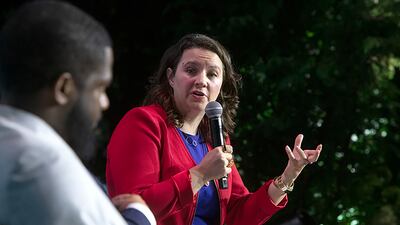Cop28 is coming at a crucial “pivot point” in the climate crisis, a UN expert has said.
Cassie Flynn, global director of climate change at the UN Development Programme, cautioned that the world was past the point of simply lowering emissions and thinking the situation could return to normal.
Speaking at the Middle East and North Africa Climate Week on Tuesday, Ms Flynn said the talks that start in Dubai next month needed to ensure adaptation, finance and helping those most vulnerable to climate change were given equal parity.
“Even if we turned off all the emissions right now, we are locked into this reality for the next 20 to 30 years,” Ms Flynn told The National, referring to worsening extreme weather events, from wildfires to floods.
“We are seeing these impacts in real time and I think there is a collective acknowledgement that we need to move very, very quickly to meet the scale of the challenge.
“And what’s important about the UAE Cop is that it is a moment where we have to focus on what has worked, how we scale it up [and] how we get it funded.”
A report released on Monday warned that if global temperatures rise by 1°C or more on current levels, billions could face conditions so warm that their bodies will not be able to naturally cool.
The study, published in the journal Proceedings of the National Academy of Sciences, underlined the dangers of breaching the key 1.5ºC threshold on pre-industrial levels that countries agreed to aim for under the 2015 Paris deal.
At Cop28, the first stocktake since Paris will assess where the world stands in trying to limit global warming to this 1.5°C target through countries' nationally determined contributions (NDCs).
“Without these nationally determined contributions, we were on track for a 3.5ºC rise but with these pledges, they represent a 2.5ºC rise,” said Ms Flynn.
“That is still very problematic and very dangerous.”
She said new NDCs must show more ambition.
“However it is a signal that political will, when we want it to be there, is there.”
Opportunity to talk about diversification
Cop28 will take place in a country that has historically been a fossil fuel producer. At Mena Climate Week on Sunday, Dr Sultan Al Jaber, Minister of Industry and Advanced Technology and President-designate of Cop28, addressed this, stating 17 out of the past 27 Cops “have been hosted in fossil fuel-producing nations”.
Ms Flynn said this raised an opportunity to talk about diversification and what it looks like to have a “just” energy transition.
She said the phasing out of fossils generally was “very, very important” and the big question the world was looking to Cop28 to answer was “how” this could happen.
“We know it is not as easy as just pushing a button,” she said.
“The economic and social implications of the transition is a massive undertaking. That seems like an understatement.
“It is an undertaking that requires levels of investment: levels of knowledge, levels of policy signals and levels of political will that are historic, so there is a moment here where the UAE can help with those conversations.
“The world is really wanting to see those conversations front and centre in Dubai.”
Ms Flynn said the response to the climate crisis needed to encompass all areas, from cutting emissions to boosting adaptation to loss and damage, as they were all “overlapping spheres”.
She pointed to the devastating floods in Derna, Libya, and said an early warning system – which falls under adaptation – would have saved countless lives in the country. In terms of loss and damage, this was important in situations “you can’t adapt your way out from”.
“[There are] moments the seas will rise, moments where storms are too intense and frequent to keep a community there,” she said.
“There are going to be moments where there is no level of resilience that keep you safe and this is where loss and damage comes in.”
The climate expert added that a good outcome at Cop28, which will take place at Expo City Dubai from November 30 to December 12, would have three components: the first would “reinforce the 1.5ºC goal”, the second would enhance adaptation and support vulnerable countries, and the third would focus on finance.
“We have to see not just the $100 billion,” she said, referring to the missed target pledged by developing countries for climate finance.
“That has to be the floor of what we need to do. We are talking trillions of dollars to make the transitions we need to make.
“That means changing the way the global economy works. And I hope that Cop28 can really start to put us on that path.”


